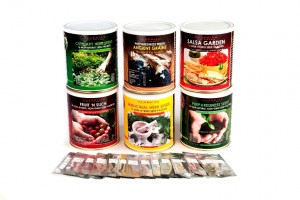Even if you live through a major world disaster, you’ve still got to eat. Sure, you’ll have stored enough survival seeds, dried and canned goods to last your group a good, long time, but no matter how well you’ve stocked up, how many cans of survival seeds you have, eventually it’s going to run out. This is when the truly prepared survivalist steps up and shines with survival gardening.
Growing your own food will be a crucial skill in a post-apocalyptic world. Scavenging only goes so far, and there is no guarantee you’ll find enough food for a balanced diet, much less one you’ll enjoy eating. Ideally, you’ve secured a large enough piece of property to put in a proper kitchen garden, but you can add to your diet in a significant way regardless of the size of your compound. If you’ve never gardened before, begin to read about the various methods for growing food and get paper copies of all instruction manuals to add to your survival supplies. Concentrate on learning about nutrition as well as methods for intensive gardening. This will get the best use out of the amount of land you own. Learn about composting to turn garbage into healthy fertilizer for the soil, and stock books on drying foods for long-term storage.
Place non-hybrid seed packets into zip-top bags and remove as much air as possible from the bags as you close them. Label the bags with the date and store them in a cool, dry place. What to grow? Start with the basic building blocks of a balanced diet, and find easily-grown foods that fit the bill. We all need protein in our diet and beans are an ideal source. You can dry them and store them easily, grow a lot of them in a relatively small space and prepare them in a large number of ways. Survival meals can be boring, so add some tomatoes and peppers into the mix to bring spice to your life. Sunflowers are not only attractive, but the seeds offer much-needed fats to your system. Greens such as spinach and kale take up little room, but are packed with nutrients your diet may otherwise lack. Survival seeds and preparedness seeds, will stay just fine for up to 4 years, if stored at 70 degrees and even much longer if kept colder. Its a great idea to have these in your garage in addition to anything else that you might have prepared for your survival. Survival gardening is all about getting the most nutrition out of the land that you control, as well as making your post-apocalyptic life just a little bit more enjoyable.

